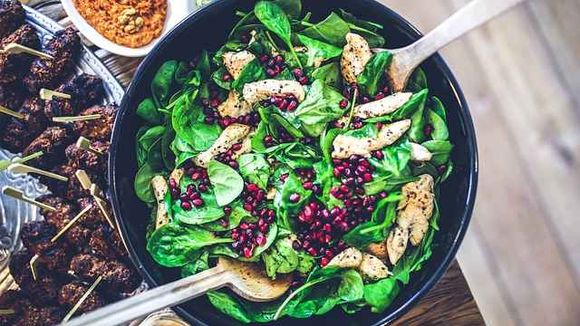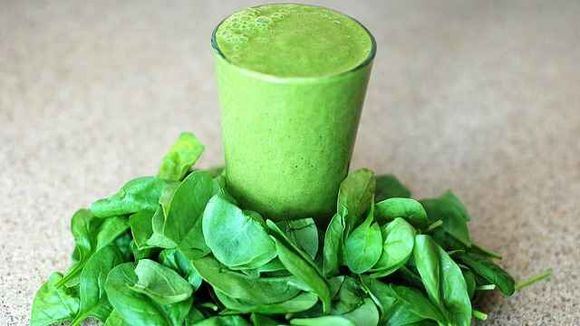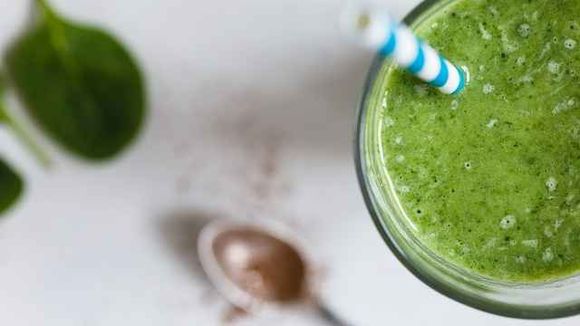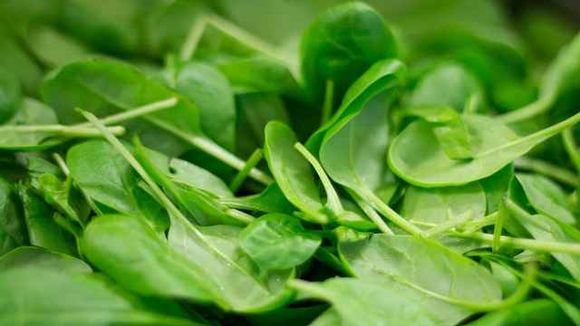Nutritional Facts and Health Benefits of Spinach
Spinach (Spinacia oleracea) is a leafy green vegetable that originated in Persia. It belongs to the amaranth family and is associated with beets and quinoa. Moreover, it is considered a very healthy food, as it is rich in nutrients and antioxidants, strengthening the body's defenses.
There are many ways to prepare spinach. You can buy it canned or fresh and consume it boiled or raw. It is delicious both alone and in other dishes, and you can add it to a morning healthy breakfast smoothie.
The nutritional facts about 100 grams of raw spinach are:
- Calories: 23
- Water: 91%
- Protein: 2.9 grams
- Carbohydrates: 3.6 grams
- Sugar: 0.4 grams
- Fibre: 2.2 grams
- Fat: 0.4 grams
Spinach as a superfood is full of some extremely important nutrients for health, including:
- Calcium: Spinach is said to contain 250 milligrams of calcium in one cup. This element supports bones and teeth. In addition, to get the most out of spinach, it is recommended to combine it with foods rich in vitamin C, such as citrus fruits, to increase calcium absorption.
- Magnesium: Magnesium is thought to boost your metabolism, regulate your heart rate, and maintain blood pressure. Spinach is a rich source of dietary magnesium, which can benefit your health in many ways.
- Iron: Your body needs iron to use your body energy efficiently. To get the most out of your iron content, you can add some vitamin C foods like citrus fruits to spinach and improve iron absorption.
Health Benefits Provided by Spinach

Reduces blood sugar
It is believed that spinach has a high content of potassium, which is usually recommended for people suffering from high blood pressure. So how is potassium useful for a person suffering from high blood pressure? First of all, potassium reduces the effects of sodium in the body. 1
Supports good bone health

Spinach contains vitamin K, which helps with good bone health. It also improves the absorption of calcium by the body. Spinach contains 250 milligrams of calcium per cup and this is very good for your bones and teeth.
Helps with weight loss
If you plan to lose weight, then it is advisable to add spinach to your weight loss diet. Spinach leaves help with weight loss and are also low in calories. The high fiber content also helps with good digestion, regulates low blood sugar and prevents constipation.
Useful for vision
The antioxidants found in spinach are lutein and zeaxanthin, and they help maintain good vision. It also protects the eyes from cataracts, age-related macular degeneration and other eye problems. The vitamin A contained in spinach helps maintain mucous membranes, which are essential for normal vision. [ref. 1]
Reduces hypertension
Hypertension is also known as high blood pressure, which is responsible for causing many heart disease, kidney disease, and strokes. Eating spinach can prevent all these risks and reduce the risk of developing them. 3
Support for the nervous system

Spinach is a source of zinc and magnesium, which are important for you to sleep well at night. And a good night's sleep is crucial for good health and a normally functioning nervous system. The vitamin K contained in spinach helps a healthy nervous system, among other elements.
Keeps the brain in good shape
Spinach helps the smooth functioning of the brain, especially in old age. In this way, regular consumption of this vegetable will keep your brain active and with normal function.
Strengthens immunity
It is claimed that the vitamin A content found in spinach strengthens entry points into the human body, such as the respiratory, intestinal tract and mucous membranes. If you consume one cup of spinach every day, you will also get this benefit.
Prevents anemia
Spinach has a high iron content in it, which can protect you from developing anemia. Iron is also useful for menstruating women, children and adults. Iron also boosts energy in the human body and helps carry oxygen to all cells of the body.
Prevents the development of cancer
Spinach is an excellent source of zeaxanthin and carotenoids, which can expel free radicals from the body. These free radicals make your body prone to many diseases, including cancer, and as a result, spinach is believed to prevent cancer.
There is evidence that diets rich in vegetables reduce the risk of cancer, suggesting edible plants as potential sources of anti-cancer agents. Spinach plays an important role in the supply of nutrients as it is a superb source of vitamin K, vitamin A, manganese, magnesium, folic acid, iron, vitamin C, vitamin B2 and potassium and includes a lot of dietary fiber, vitamin B6, vitamin E and omega-3 fatty acid acids.
In addition, spinach includes essential antioxidants from carotenoids and polyphenols, which exhibit anti-cancer properties. Spinach has at least three other important anti-cancer components, including:
- Monogalactosyl diacylglycerol (MGDG)
- Digalactosyl diacylglycerol (DGDG)
- Sulfoquinosyl diacylglycerol (SQDG)
They can slow the growth of cancer. In one study, these compounds helped slow tumor growth in the cervix in humans. They also reduce the size of the tumor. 4 MGDG and SQDG were shown to inhibit the activities of mammalian DNA polymerases, but DGDG had no such inhibitory effect in all studies. The effect of these glycoglycerolipids on cancer cells, angiogenesis and growth of solid tumours can be mediated by their inhibition of replicative DNA polymerase activity.
Several other human studies have linked spinach consumption to a reduced risk of prostate cancer. Eating this leafy vegetable may also help prevent breast and colon cancer, according to several studies. 5
A 2016 scientific publication mentions the inhibitory effects of spinach, cabbage and onion extracts on the growth of cancer cells. 6 The results showed that spinach, cabbage and onion extracts inhibited the growth of human gastric AGS, human breast cancer MDA-MB-231 and SK-BR-3 cells by inducing apoptosis. Curiously, in this study, onion extract had a stronger anti-cancer effect and induction of apoptosis than spinach and cabbage extracts.









